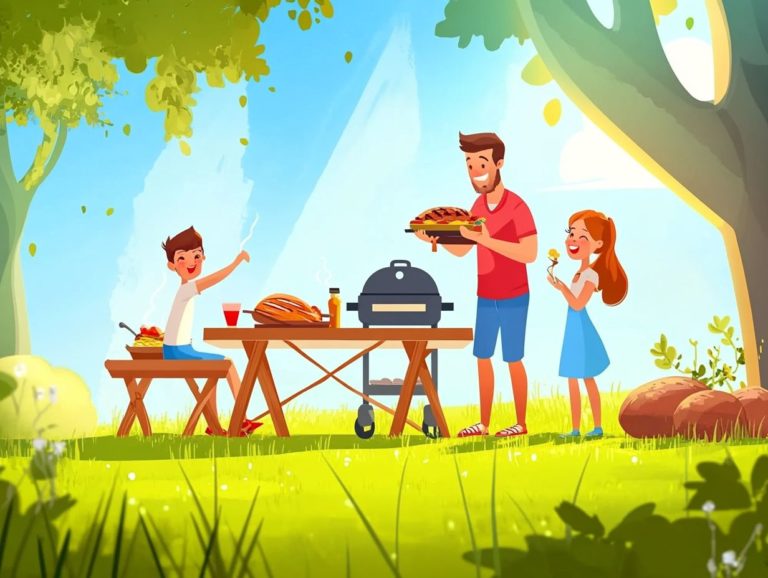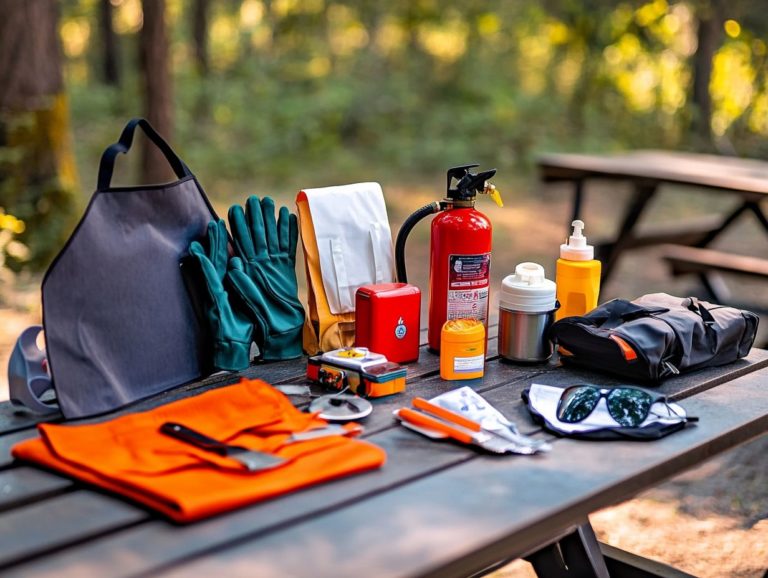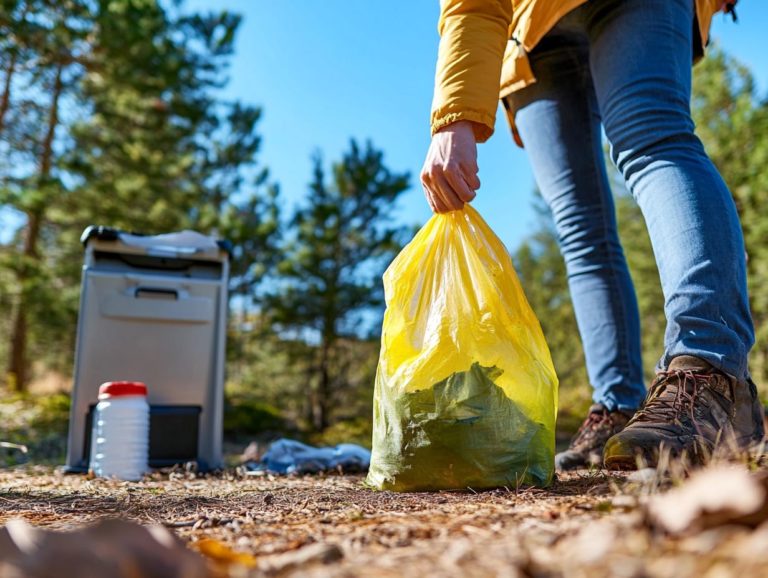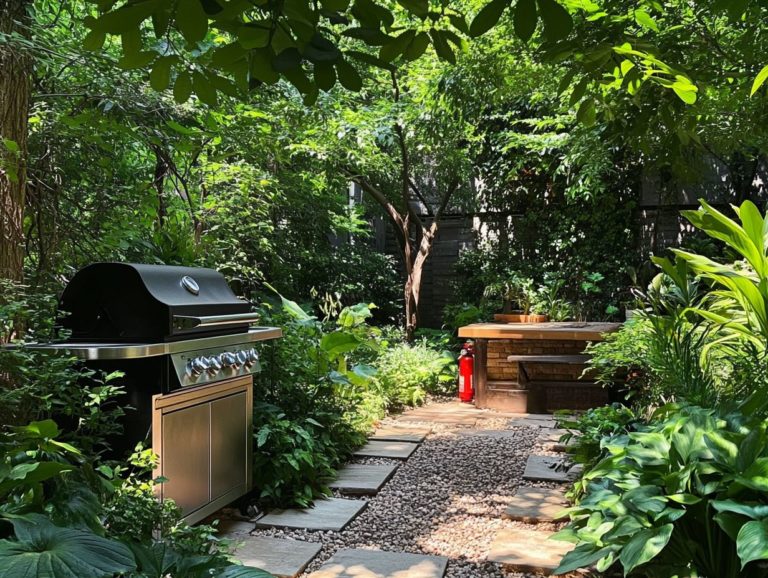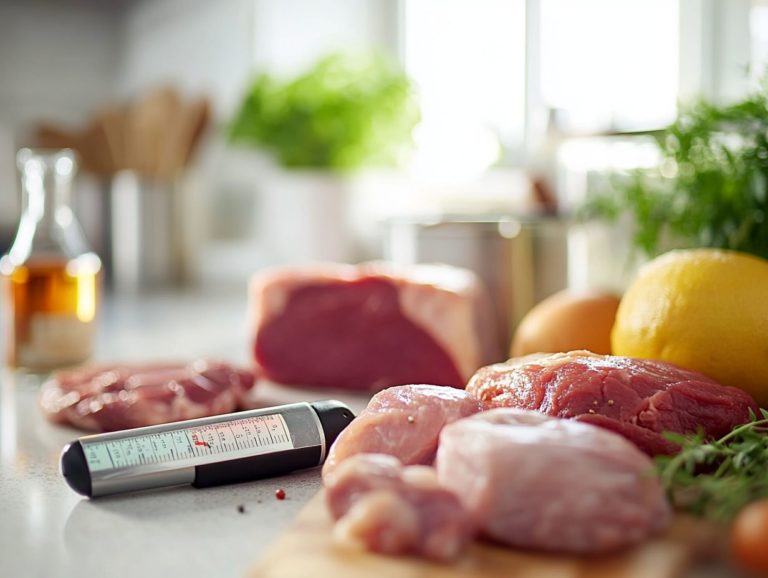Top 10 Safety Tips for Outdoor Cooking Equipment
Cooking outdoors can be a delightful experience, allowing you to savor a meal while immersing yourself in nature. While grilling burgers or roasting marshmallows, safety is key. Learn how to handle your equipment safely.
This guide offers ten essential safety tips. These will help you enjoy outdoor cooking without accidents.
It also answers common questions about outdoor cooking. You can focus on what really matters: delicious food and time with loved ones.
Contents
- Key Takeaways:
- 1. Choose a Safe Location for Your Cooking Equipment
- 2. Keep Children and Pets Away from the Cooking Area
- 3. Use Cooking Equipment According to Manufacturer’s Instructions
- 4. Keep a Fire Extinguisher Nearby
- 5. Never Leave Cooking Equipment Unattended
- 6. Use Long-Handled Utensils to Avoid Burns
- 7. Keep a Safe Distance from Flammable Objects
- 8. Clean and Maintain Your Cooking Equipment Regularly
- 9. Be Aware of Weather Conditions
- 10. Have a First Aid Kit On Hand
- What Are the Most Common Accidents Related to Outdoor Cooking Equipment?
- Frequently Asked Questions
- What are the top 10 safety tips for outdoor cooking equipment?
- What should I do if there is a gas leak from my outdoor cooking equipment?
- How can I prevent foodborne illnesses while using outdoor cooking equipment?
- What should I do if a fire breaks out while using outdoor cooking equipment?
- Are there any safety precautions I should take when using charcoal grills and other outdoor cooking equipment?
- What steps can I take to prevent burns while using outdoor cooking equipment and to ensure food safety?
Key Takeaways:
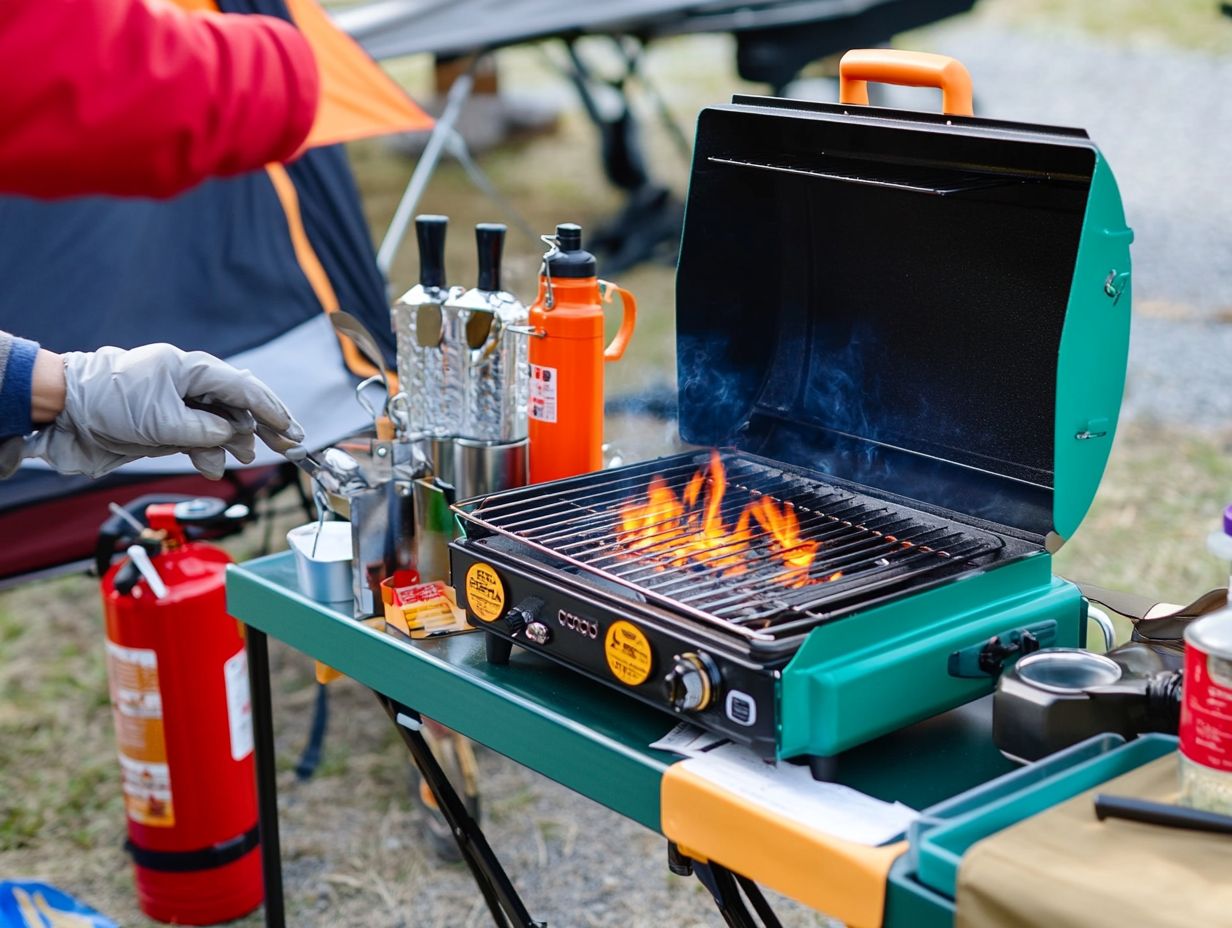
- Choose a safe location for your outdoor cooking equipment to prevent accidents.
- Keep children and pets away from the cooking area to avoid potential hazards.
- Follow the manufacturer’s instructions to ensure safe and proper use of cooking equipment.
1. Choose a Safe Location for Your Cooking Equipment
Choosing a safe spot for your cooking equipment is essential for ensuring how to grill safely during outdoor gatherings. It minimizes the risk of accidents and lets you savor the festivities without a care in the world. Consider key factors like distance from flammable objects, wind direction, and how close you are to your home and neighbors, especially in places like South Carolina, where outdoor cooking thrives.
Grillers should keep a minimum distance of at least 10 feet from structures and overhanging branches, creating a clear safety zone that s free from any flammable materials. When setting up a charcoal grill, opt for a flat, stable surface to prevent it from tipping. Also, keep an eye on the wind direction to make sure those pesky embers don t find their way to combustible materials.
For gas grills, place the unit on a level surface away from walls and furniture. Always follow the guidelines from a safety organization that helps prevent fires, which emphasizes checking for leaks before igniting and having a fire extinguisher handy. Additionally, consider these top food safety tips for outdoor events. These precautionary measures not only boost safety but also ensure you have a worry-free grilling experience.
2. Keep Children and Pets Away from the Cooking Area
To ensure grilling safety, it’s crucial to keep children and pets away from the cooking area. This simple step significantly reduces the risk of accidents and fire-related incidents during your outdoor cooking adventures.
Establishing clear barriers, like portable fencing or designated zones, can create effective physical boundaries that further protect your loved ones. Using outdoor playpens for younger children can offer a secure space where they can enjoy some fresh air while you cook, keeping them entertained and safe.
You might also consider engaging kids in age-appropriate, supervised activities, like assembling kebabs or preparing side dishes in a safe area away from the grill. This way, they can feel included in the cooking process while remaining at a safe distance from any heat sources.
3. Use Cooking Equipment According to Manufacturer’s Instructions
Following the manufacturer’s instructions when using cooking equipment is essential for grilling safety, whether you’re working with a gas grill, charcoal grill, or any other outdoor cooking device.
Understanding these instructions not only elevates your cooking experience but also significantly minimizes the risk of accidents. Each type of grill comes with its unique safety precautions tailored to its design and fuel source. It’s easy to overlook these details, but doing so can lead to common pitfalls, like improper lighting techniques or forgetting to ensure adequate ventilation.
Regular maintenance is crucial; it prevents malfunctions that could create dangerous situations. By adhering closely to the outlined guidelines, you create a safer grilling environment, allowing you to enjoy your meals without the nagging worry of safety issues.
4. Keep a Fire Extinguisher Nearby
Having a fire extinguisher nearby is an essential safety measure for anyone engaging in outdoor cooking. It swiftly mitigates any fire hazards that might arise during grilling.
It’s important to understand the different types of fire extinguishers tailored for gas and charcoal grills for your safety. Having a first aid kit nearby can also be beneficial.
Class B extinguishers are designed for flammable liquids and are perfect for gas grills. In contrast, Class K extinguishers are effective against grease fires and are particularly beneficial for charcoal grills.
It s vital to place the extinguisher within easy reach ideally within 10 feet of the grill. This way, you can grab it in a flash if an emergency strikes!
Knowing how to use the extinguisher can help you respond quickly. Take a moment before you start grilling to read the instructions and practice using it properly. This can transform a potentially alarming situation into a controlled and effective response.
5. Never Leave Cooking Equipment Unattended
One of the most crucial grilling safety tips you should keep in mind is to never leave your cooking equipment unattended. This simple precaution can help prevent home fires and serious accidents, especially during outdoor cooking with pets.
Maintaining your focus while grilling is essential not just for the quality of the food but also for safety. Distractions from conversations, pets, or buzzing phone notifications can lead to burnt dishes or dangerous flare-ups.
To manage cooking times effectively, consider setting a timer on your phone or using a kitchen timer. This way, you can keep track of your food without needing to hover over the grill.
Designating a specific area for your ingredients and tools can minimize the risk of accidents. By keeping a vigilant eye on both the grill and the surrounding space, you can quickly address hazards like low-hanging branches or children playing nearby.
This attention to detail will ensure a safer and more enjoyable grilling experience for you and your guests.
6. Use Long-Handled Utensils to Avoid Burns
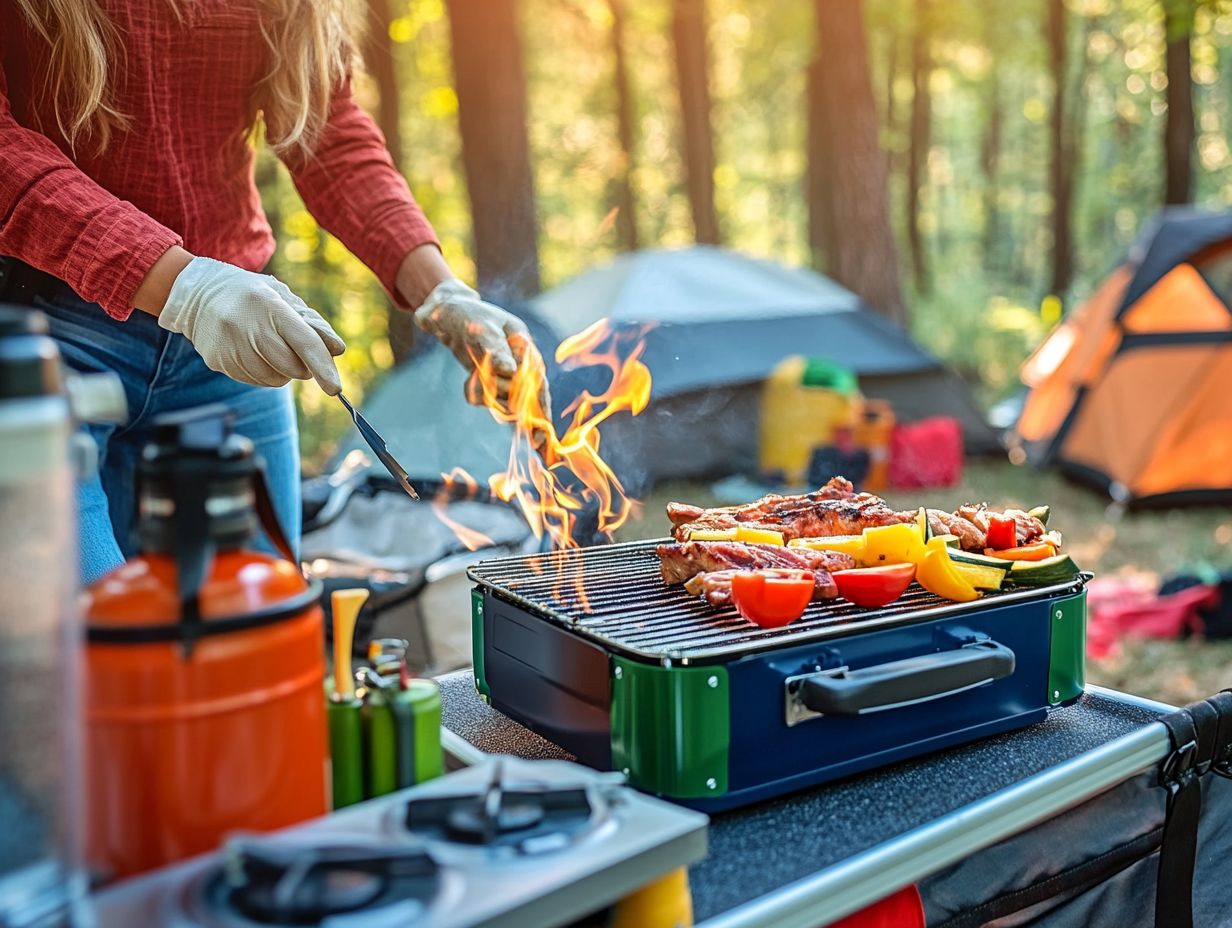
Using long-handled utensils is essential for your grilling safety. They allow you to avoid burns and injuries while cooking outdoors, keeping you at a safe distance from the heat.
These tools such as tongs, spatulas, and forks are crafted for a comfortable grip and superior maneuverability. Long-handled tongs are your best friends for flipping burgers or turning hot dogs without getting too close to the flames.
A sturdy spatula effortlessly lifts and serves delicate items like fish fillets, while grilling forks with sharp prongs make it easy to pierce and rotate larger cuts of meat.
By using these specialized utensils, you not only shield yourself from intense heat but also enhance your precision in food handling. This results in a delightful grilling experience that leaves both you and your guests satisfied.
7. Keep a Safe Distance from Flammable Objects
Maintaining a safe distance from flammable objects is crucial for your grilling safety. This practice significantly minimizes the risk of fire hazards during your outdoor cooking adventures.
You might not realize that common items in your backyard could become dangerous threats if they’re too close to the heat source. Foliage, such as dry leaves and overhanging branches, can easily catch fire from a stray spark.
Patio furniture made of fabric or plastic can ignite quickly, turning a minor incident into a full-blown fire. Consider the propane tanks as well; if they aren t stored or positioned correctly, they could leak gas or even become explosive under high temperatures.
To manage these risks effectively, ensure that your grilling area is free from these items. Maintain a minimum distance of at least 10 feet, and always keep a fire extinguisher handy to tackle any emergencies that might arise.
8. Clean and Maintain Your Cooking Equipment Regularly
Regularly cleaning and maintaining your cooking equipment, including both charcoal and gas grills, is crucial for ensuring grilling safety and achieving the best cooking results.
A well-kept grill not only enhances the flavor of your food but also significantly reduces the risk of flare-ups and fire hazards. For charcoal grills, regularly remove ash and thoroughly clean the grates to prevent buildup that could affect both taste and safety.
On the flip side, gas grills require close attention to their burners and drip trays; leftover grease can harden and lead to dangerous blockages. By establishing a consistent cleaning routine for each grill type, you can savor delicious meals while extending the lifespan of your equipment.
Ultimately, investing time in maintenance means better food quality, less stress, and more enjoyable grilling experiences.
9. Be Aware of Weather Conditions
Being mindful of the weather is essential for ensuring grilling safety, as adverse conditions can introduce unexpected hazards during your outdoor cooking sessions. Strong winds, for example, could dangerously fan the flames.
If rain is on the horizon, it s prudent to have a sturdy, well-ventilated shelter ready to protect both you and your grill from getting drenched. High winds can complicate temperature control and pose fire risks, so it s wise to position your grill in a more sheltered spot in your backyard, especially during outdoor festivities.
Check the local weather forecasts now to stay safe while grilling! Simple tools like weather apps can offer real-time updates, enabling you to make informed decisions about when and where to grill, ensuring a safe and enjoyable experience no matter what Mother Nature has in store.
Always consider the safety zone around your cooking area.
10. Have a First Aid Kit On Hand
Keep a first aid kit handy! It s a smart move for grilling safely, equipping you to handle any injuries that might arise during your outdoor culinary adventures, such as burns or cuts from grilling utensils.
When flames and hot surfaces are in the mix, it s essential to include specific items tailored for potential mishaps. Your kit should ideally feature a fire extinguisher for emergencies:
- Burn cream to soothe skin irritations from those accidental burns,
- Adhesive bandages for minor cuts and scrapes that are bound to happen,
- Antiseptics to cleanse wounds and lower the risk of infection,
- A pair of tweezers to help you easily remove splinters or debris.
Regularly checking your kit is vital to ensure all supplies are stocked and effective. This preparedness allows for quick and efficient responses to any emergencies, including food poisoning or injuries, ultimately elevating your overall grilling experience.
What Are the Most Common Accidents Related to Outdoor Cooking Equipment?
Understanding the most common accidents associated with outdoor cooking equipment is essential for enhancing your grilling safety and preventing mishaps during your outdoor gatherings, especially when using a gas grill or charcoal grill.
Be aware of potential risks like burns, food poisoning, and equipment malfunctions that can arise while preparing meals outdoors, particularly during summer when many families gather for outdoor festivities. Burns frequently occur when individuals aren’t vigilant around hot surfaces or flames. By using long-handled grilling utensils and wearing heat-resistant gloves, you can significantly reduce this risk. Additionally, knowing what to do in case of an outdoor cooking accident can further enhance your safety while enjoying outdoor cooking.
You can reduce the risk of equipment malfunctions like gas leaks, which happen when propane escapes from the tank by conducting regular maintenance checks. Food poisoning can result from improperly stored or undercooked foods, making it vital to keep raw ingredients separate and at the correct temperatures, especially when cooking outdoors.
By understanding these risks and adopting practical safety tips for open flame cooking, you can transform outdoor cooking into a much safer and more enjoyable experience.
What Are the Safety Precautions for Using Propane Tanks?
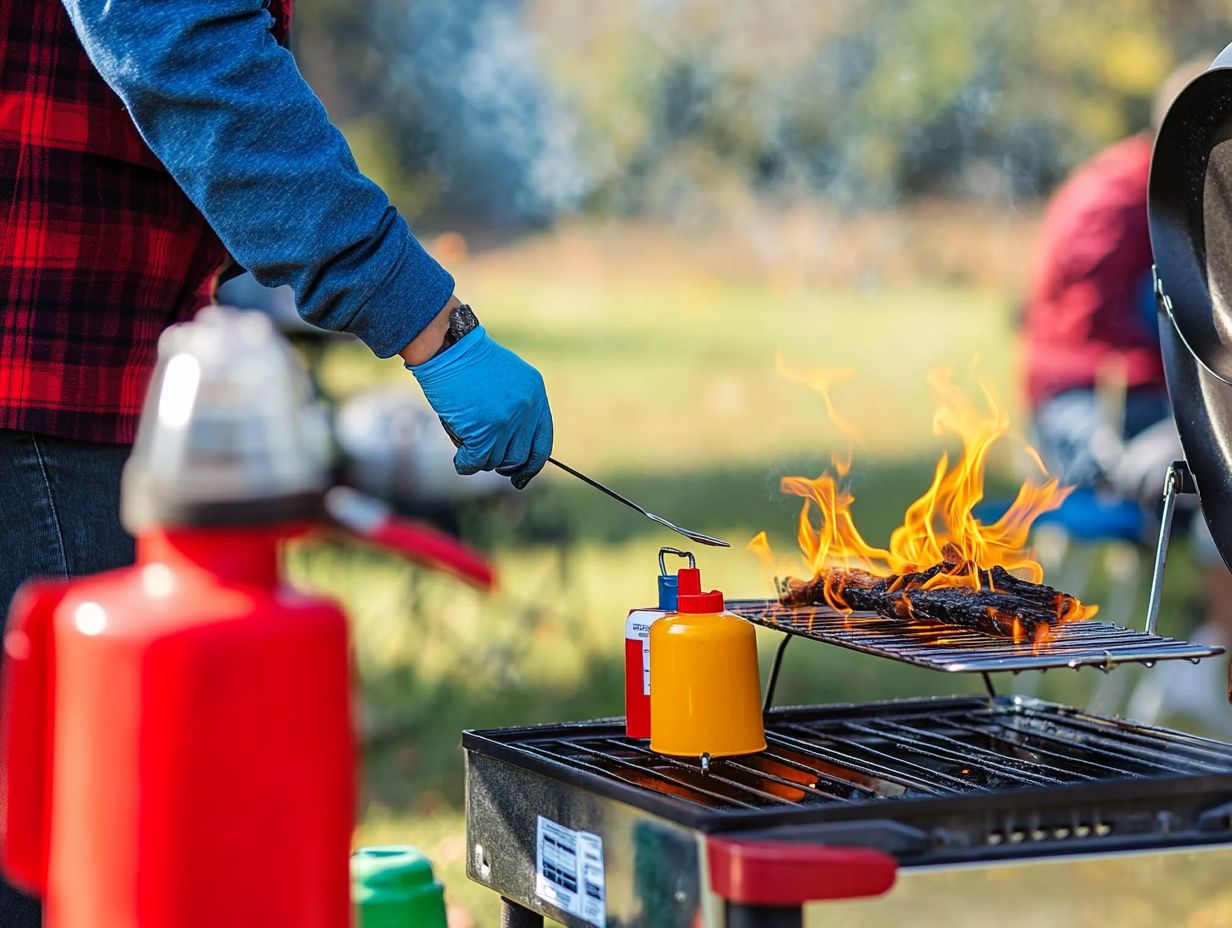
Following safety precautions with propane tanks is vital to prevent accidents and ensure a secure outdoor cooking experience while grilling. To further enhance your safety, be aware of the top risks of outdoor cooking and how to avoid them.
To enhance your safety during grilling sessions, it s crucial to adhere to specific guidelines, starting with the proper storage of propane tanks. Ensure they are away from children and pets, kept upright in a well-ventilated area, and away from any heat sources or open flames to prevent fire hazards.
Regularly checking for leaks is equally important. You can do this by applying soapy water to the connections if bubbles start to form, you have a problem that could lead to home fires. Be aware of signs of malfunction, like hissing sounds or unusual odors, so you can take immediate action.
When handling propane, always wear protective gear, including gloves and goggles. Exercise caution to ensure safety while grilling. Keep flames away from the tank and ensure the area is free from obstructions, safeguarding yourself and your grilling experience.
How Can One Prevent Foodborne Illnesses While Cooking Outdoors?
Stay committed to food safety when cooking outdoors. This is particularly important for food storage and temperature management, especially when using a meat thermometer.
Maintaining the right temperatures is essential to keep your food safe for consumption, as incorrect temperatures can lead to food poisoning. It s highly advisable to invest in a reliable meat thermometer to accurately check internal temperatures.
Cleanliness in your food preparation areas is crucial to prevent bacterial contamination from raw ingredients or cooking utensils. Regularly sanitize surfaces and ensure that utensils are stored correctly to avoid the risk of cross-contamination.
Organizing your storage spaces effectively for raw and cooked foods is key. Make sure everything is kept at the correct temperatures and separated to minimize the risk of foodborne pathogens. Improper handling can lead to severe illnesses, so embracing these practices will ensure your outdoor cooking experience is both safe and delightful.
What Are Some Safety Tips for Using Charcoal Grills?
To use charcoal grills safely, follow these key precautions to enhance your grilling experience and enjoy seamless outdoor cooking sessions, especially with proper grill maintenance.
- First and foremost, ensure adequate ventilation. This not only facilitates even cooking but also prevents the accumulation of harmful gases.
- When lighting the charcoal, opt for a chimney starter, a tool that helps light charcoal without lighter fluid. This simple choice helps you avoid pesky flare-ups.
- Properly disposing of ash is another vital step. Wait until it s fully cooled, then place it in a designated metal container to eliminate any fire hazards.
- Regular maintenance, such as cleaning the grill grates, checking for gas leaks, and ensuring proper ash disposal after each use, can significantly reduce the risk of flare-ups. This ensures everyone enjoys delightful meals without unnecessary risks.
How Can One Safely Dispose of Hot Coals?
Dispose of hot coals safely to prevent fire hazards during your outdoor cooking adventures, especially if children and pets are nearby.
After wrapping up your grilling session, let the coals cool completely before handling them, ensuring that the grilling area remains safe. Transfer the ashes and leftover coals into a sturdy metal container designed specifically for this purpose. Keep it away from flammable materials and the grill area. Avoid using any combustible materials for storage, as they can easily ignite.
Once you ve placed the coals in the container, it s smart to sprinkle a bit of water over them to guarantee they are fully extinguished and that no embers remain. Once everything is cool, dispose of the contents according to local regulations to help maintain safety and protect the environment.
What Are the Safety Guidelines for Using Electric Grills?
Safety guidelines for using electric grills are crucial for ensuring a secure grilling experience that complements your passion for outdoor cooking and protects your grill from accidental damage.
Understanding specific safety practices can significantly enhance your enjoyment of this modern grilling method. As a grilling enthusiast, you should prioritize a proper setup by placing your grill on a stable, flat surface and keeping it well away from flammable materials like wooden decks or dry grass. Ensure the area is safe for children and pets.
It s also vital to keep the grill sheltered from water exposure to prevent any risk of electric shock. Using the grill under a covered patio or in dry conditions is highly advisable, especially when using gas or charcoal grills.
Make sure every electrical connection is secure to enjoy worry-free grilling! Regularly inspect cords for wear to mitigate potential hazards associated with electric grills.
By following these recommendations, you can relish the delicious flavors of grilled foods while enjoying complete peace of mind, knowing that you ve taken the necessary cooking precautions.
Frequently Asked Questions
What are the top 10 safety tips for outdoor cooking equipment?
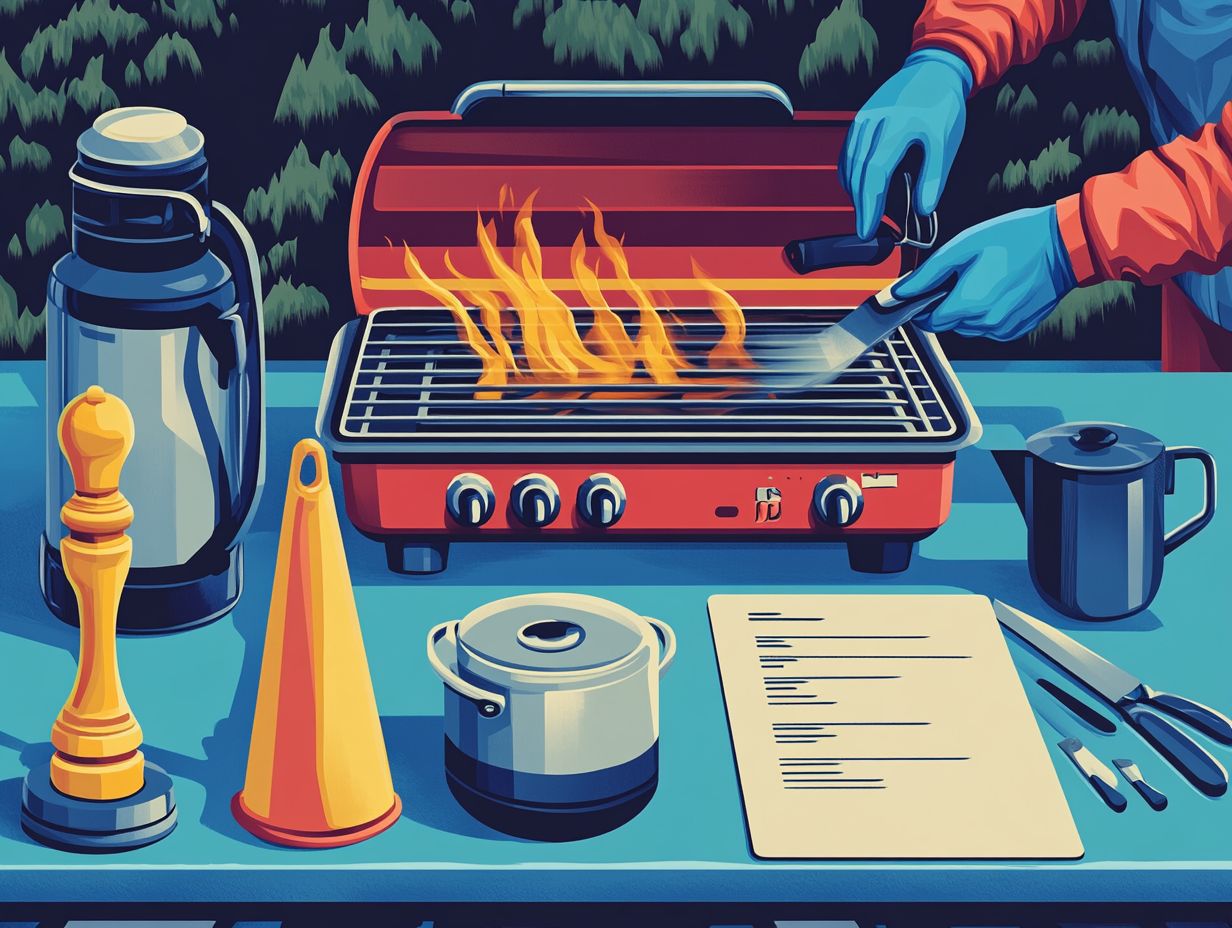
- Always read the instruction manual before using any cooking equipment, including your propane and charcoal grills.
- Keep a fire extinguisher nearby in case of emergencies.
- Never leave cooking equipment unattended.
- Keep the area around the cooking equipment clear of any flammable materials.
- Make sure to clean and maintain your equipment regularly.
- Use long-handled grilling utensils to avoid getting burned, particularly when handling hot coals or gas grills.
- Keep children and pets away from the cooking area.
- Be aware of weather conditions and avoid using equipment in high winds or other hazardous conditions.
- Use proper protective gear, such as oven mitts, when handling hot equipment, especially when cooking with gas or charcoal.
- Always have a first aid kit on hand in case of accidents.
What should I do if there is a gas leak from my outdoor cooking equipment?
If you smell gas or suspect a leak from your propane tank, immediately turn off the gas supply and open all windows and doors to ventilate the area. Do not use any sources of ignition, such as matches or lighters. Contact your gas company for assistance and do not use the equipment until it has been inspected and deemed safe. Always prioritize safety tips when cooking outdoors.
How can I prevent foodborne illnesses while using outdoor cooking equipment?
Make sure to clean and sanitize all cooking equipment before and after use. Use separate cutting boards and kitchen utensils for raw and cooked foods. Cook meat and poultry to their appropriate internal temperatures using a meat thermometer.
Avoid leaving food out in hot temperatures for extended periods to prevent food poisoning.
What should I do if a fire breaks out while using outdoor cooking equipment?
If a fire breaks out, remain calm and immediately turn off the gas supply. If it is a small fire, use a fire extinguisher to put it out. If the fire is too large to control, evacuate the area and call the fire department. Do not attempt to move the equipment or use water to put out the fire, as this can spread the fire and cause further damage.
Are there any safety precautions I should take when using charcoal grills and other outdoor cooking equipment?
Yes, always use charcoal grills in a well-ventilated area and never indoors. Avoid using lighter fluid or gasoline to start the grill, as this can cause flare-ups and lead to fires. Properly dispose of used charcoal in a metal container and wait for it to cool down completely before disposal.
Having a fire extinguisher nearby is also a crucial safety precaution.
What steps can I take to prevent burns while using outdoor cooking equipment and to ensure food safety?
Always use protective gear such as oven mitts and long-handled tools. When opening the lid of a grill or smoker, open it slowly and away from your body to avoid hot steam or flames. Also, make sure to cool down equipment properly before touching or cleaning it.
Having a first aid kit and a meat thermometer can help in case of emergencies or to ensure food reaches safe temperatures.


